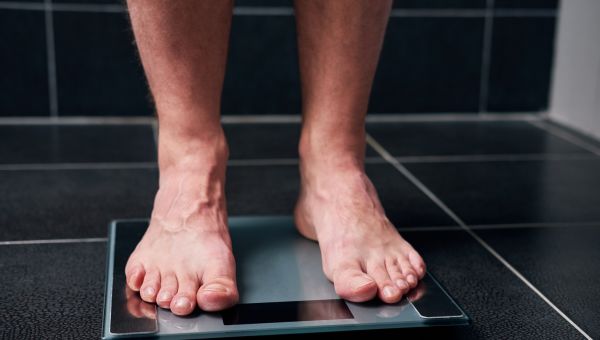Why your weight fluctuates and 5 easy fixes
Despite your best efforts, your weight goes up and down, seemingly uncontrollably. Here's why.
Updated on September 22, 2025

If you’re on a journey to drop pounds, weight fluctuations can be a bit disappointing. But don’t get discouraged; the causes of these increases and decreases may be beyond your control. Water retention, hormones and the time of day you weigh in could be to blame for inconsistencies.
Rest assured, fluctuations in your weight are normal—most of the time. Here are five reasons the numbers on the scale might rise and fall, despite your best efforts both in the kitchen and at the gym.
Medically reviewed in September 2019.

You're retaining water
The human body is about 60 percent water and 40 percent other stuff, and it's always working to maintain that general equilibrium. Throughout the day, as you take in water from food and drink, your kidneys, hormones and other hormone-like substances collaborate to remove excess fluid, which is then converted into urine. But sometimes, your body holds onto extra fluid. Why?
There are several reasons for water retention, including a sodium-rich diet, certain medications, your period and lack of exercise. All of these trigger your body to hold onto excess water, which translates to higher numbers on the scale.
If you suspect these may be the causes, try switching up your routine: eat less salt and get regular exercise.

You're Gaining Muscle
Since muscle is denser than fat, if you gain muscle and lose fat, you can gain weight while looking slimmer. If your weight loss regimen includes pumping iron or doing pushups, the increase on the scale could be blamed on new muscle.
So how does this work? Often, when your muscles experience trauma, as is common with vigorous exercise, small tears in the muscle fibers occur. These tears are repaired by other cells, which then become part of the muscle, thus making them bigger. During this process, your body tends to retain a bit extra water, which goes away within a couple of days; this may be what makes your weight appear to fluctuate.
If you’re looking to distinguish between a bit of excess water and a few pounds of muscle, try measuring your waistline regularly. If it's slimming down, but the numbers on the scale are going up, muscle might be the culprit.

You need to use the bathroom
So, you’re backed up—it happens to the best of us. Constipation—difficult or less frequent bowel movements—can be caused by a number of factors, including medication, stress, a diet low in fiber or a lack of water or exercise.
But how much does it affect the number on the scale? One study suggests the average adult passes 106 grams, or about four ounces, of stool each day. When bowel movements are normal, this won’t likely change your weight. But, when stool builds up over a few days, your weight may jump a pound or two.
Constipation can usually be remedied at home with fluids, activity and fiber-rich foods. If symptoms persist, speak with your doctor about medication.

You carb-loaded
We all need carbohydrates, the body’s main source of energy. Despite this, dieters often feel they need to avoid carb-heavy foods—like rice, pasta and bread—in hopes of shedding pounds. But nobody is perfect; maybe you had a few extra beers or indulged at the Italian restaurant last night.
Whatever the reason for an influx of carbs, you might find you weigh more the next morning. Why is this so? After carbs are ingested, your body turns them into glucose, or sugar, which is stored in your liver, muscles and fat cells to be used at a later time. This sugar isn’t stored alone—it’s accompanied by water. The water your body is retaining, due to yesterday’s carb intake, might be the reason for the fluctuations in your weight.

You weigh in at different times
It’s common to weigh less in the morning, especially after going to the bathroom, than after a full day of eating and drinking. We stuff ourselves throughout the day, and regardless of how healthily we eat, that mass of undigested food and drink pushes the numbers on the scale upward. For more consistent numbers, weigh yourself at the same time each day. Give the morning a try, or opt for a weekly weigh-in instead! Stepping on the scale less frequently helps you gauge long-term results, rather than daily fluctuations.
If your weight rises and falls by more than just a few pounds, or if weight gain is sudden or unexplained, it could signal a more serious problem, like a thyroid imbalance. Any concerns about fluctuations should be discussed with your healthcare provider.
More On


video

article

slideshow


video


video
